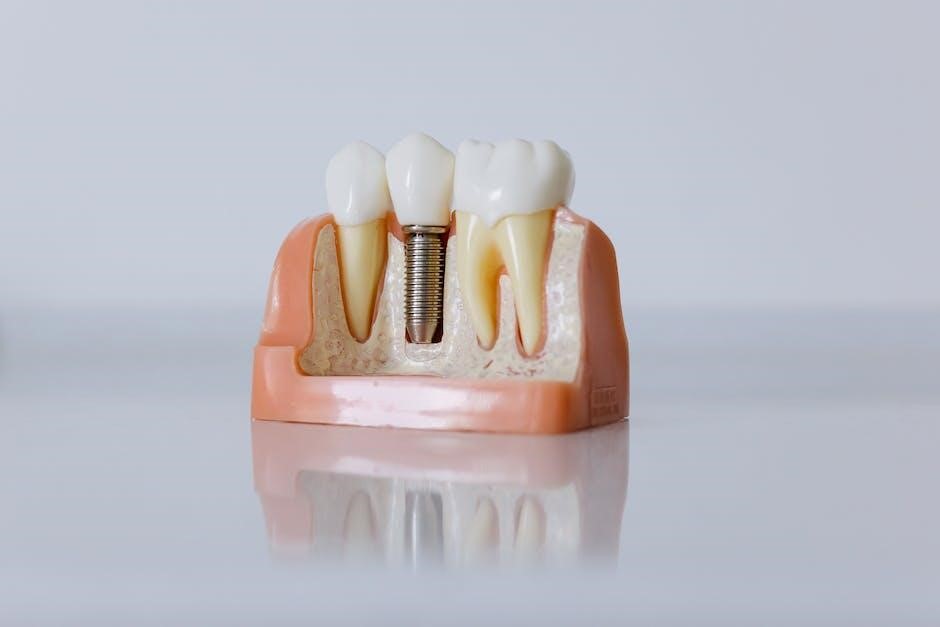Dental health is paramount. When it comes to replacing missing teeth, dental implants are often regarded as the best option. They provide a durable, natural-looking solution that can significantly enhance your quality of life.
However, not all dental implants are created equal. Choosing the best dental implants for your unique needs can be a complex process.
This comprehensive guide aims to provide you with all the information you need to make an informed decision. Let’s dig in!
Understanding Dental Implants
Before we dive into the specifics of choosing the best dental implants, it’s essential to understand what they are.
Dental implants are artificial tooth roots. They are typically made of titanium, that are surgically placed into the jawbone. They provide a stable base for attaching artificial teeth, such as crowns, bridges, or dentures.
The process involves several stages. This includes the initial consultation and surgical placement of the implant. It also includes the osseointegration, and the final placement of the artificial tooth.
Benefits of Dental Implants
Dental implants offer numerous advantages over other tooth replacement options. Here are some of them:
Durability
Dental implants are designed to last for a long time. With proper care, they can potentially last a lifetime. This makes them one of the most durable tooth replacement options available.
Natural Look and Feel
One of the greatest benefits of dental implants is that they look and feel like natural teeth. This is because they are anchored in the jawbone, just like real teeth. This also means that they function like natural teeth, allowing you to eat, speak, and smile with confidence.
Prevents Bone Loss
When a tooth is missing, the jawbone can start to deteriorate due to lack of stimulation. Dental implants act as artificial tooth roots. They help prevent bone loss by stimulating the surrounding bone tissue.
Preserves Adjacent Teeth
Other tooth replacement options, such as bridges, require the support of adjacent teeth. This can lead to those teeth becoming weakened over time. With dental implants, there is no need for support from neighboring teeth, helping to preserve their integrity.
Factors to Consider When Choosing Dental Implants
Choosing the right dental implants involves several factors that you need to consider. These include your oral health, bone density, lifestyle, and budget. Let’s explore each of these factors in detail.
Oral Health
Your overall oral health plays a crucial role in determining whether you are a suitable candidate for dental implants. Conditions like gum disease or severe tooth decay can affect the success of the implant.
It’s essential to address any underlying oral health issues before considering dental implants. Your dentist will conduct a thorough examination, including X-rays and possibly a CT scan, to assess your oral health and jawbone condition.
Bone Density
Bone density is another critical factor. Since dental implants need to fuse with the jawbone, sufficient bone mass is necessary to support the implant securely.
If you have experienced bone loss due to periodontal disease or long-term tooth loss, you might require a bone graft to build up the bone before the implant procedure. Your dentist will evaluate your bone density and discuss the need for any additional procedures.
Lifestyle
Your lifestyle can also impact the choice of dental implants. For example, if you are a smoker, you may face a higher risk of implant failure. Smoking impairs the healing process and affects the integration of the implant with the jawbone.
Similarly, if you have certain medical conditions like diabetes or take medications that affect bone healing, these factors need to be considered. Discussing your lifestyle and medical history with your dentist will help determine the best course of action.
Budget
Budget is an important consideration when choosing dental implants. While they are a more expensive option compared to dentures or bridges, their longevity and benefits often justify the cost.
It’s essential to discuss the cost of the entire procedure with your dentist, including any additional treatments like bone grafts or sinus lifts. Many dental clinics offer financing options to make the treatment more affordable.
Types of Dental Implants
There are several types of dental implants available, each with its own advantages and considerations. The main types include endosteal implants, subperiosteal implants, and zygomatic implants.
Endosteal Implants
Endosteal implants are the most common type of dental implants. They are placed directly into the jawbone and are typically made of titanium. Endosteal implants are suitable for most patients, provided they have sufficient bone mass. They offer excellent stability and can support one or more artificial teeth.
Subperiosteal Implants
Subperiosteal implants are placed under the gum but above the jawbone. They are used for patients who do not have enough healthy bone and cannot undergo a bone graft. These implants consist of a metal frame that fits onto the jawbone, with posts protruding through the gums to hold the artificial teeth. Subperiosteal implants are less common and are usually considered when endosteal implants are not an option.
Zygomatic Implants
Zygomatic implants are a less common type of implant used in cases of severe bone loss in the upper jaw. Instead of being placed in the jawbone, these implants anchor in the cheekbone (zygomatic bone). Zygomatic implants are a more complex procedure and are typically recommended when other options are not viable.
All-on-4 Implants
All-on-4 implants are a type of endosteal implant that uses only four implants to support an entire arch of artificial teeth. All-on-4 dental implants are a popular option for patients who need to replace all their upper or lower teeth, providing a more affordable and efficient solution.
The Implant Procedure
Understanding the implant procedure can help alleviate any anxiety and prepare you for what to expect. The process typically involves several stages:
Consultation and Planning
The first step is a thorough consultation with your dentist. This includes a detailed examination of your oral health, X-rays, and possibly a CT scan to assess your jawbone structure. They may also use imaging tests to create a 3D image of your jawbone and plan the placement of the implant.
Your dentist will discuss your options. They will address any concerns. They will develop a personalized treatment plan.
Implant Placement
The next stage is the surgical placement of the implant. This is usually done under local anesthesia, although sedation options are available for anxious patients.
During the surgery, the dentist makes an incision in the gum to expose the bone, drills a hole in the jawbone, and places the titanium implant. The gum is then stitched back in place, and the healing process begins.
Osseointegration
Osseointegration is the process where the implant fuses with the jawbone. This typically takes several months, during which the bone grows around the implant, securing it in place.
It’s crucial to follow your dentist’s post-operative care instructions during this period to ensure successful healing. Failure to do so can lead to implant failure.
Abutment Placement
Once osseointegration is complete, a minor surgical procedure is performed to place the abutment, which connects the implant to the artificial tooth. The gum is reopened to expose the implant, and the abutment is attached. The gum tissue is then allowed to heal around the abutment.
Artificial Tooth Placement
The final stage is the placement of the artificial tooth (crown), bridge, or denture. This involves taking impressions of your mouth to create a custom-fit restoration. The artificial tooth is then attached to the abutment, completing the process.
Post-Procedure Care
Proper care after the implant procedure is essential for the longevity and success of your dental implants. Here are some key tips for post-procedure care:
Maintain Oral Hygiene
Good oral hygiene is crucial to prevent infections and ensure the longevity of your implants. Brush your teeth at least twice a day, floss daily, and use an antimicrobial mouthwash to keep your mouth clean. Your dentist may recommend specific oral hygiene products designed for implant care.
Regular Dental Check-ups
Regular dental check-ups are essential to monitor the health of your implants and address any issues early. Visit your dentist every six months for a professional cleaning and examination. Your dentist will check the condition of the implants, surrounding gum tissue, and bone structure.
Avoid Hard Foods
Avoid chewing on hard foods like ice or hard candies, as they can damage the implants or the surrounding teeth. Stick to a balanced diet that includes plenty of fruits, vegetables, and other soft foods.
Quit Smoking
If you are a smoker, quitting smoking is highly recommended. Smoking can impair the healing process and increase the risk of implant failure. If quitting is challenging, seek support from your healthcare provider or join a smoking cessation program.
Don’t Eat or Drink Immediately After Surgery
Following the implant surgery, avoid eating or drinking for a few hours until the anesthesia wears off. This will prevent you from accidentally biting your tongue, lip, or cheek.
Common Concerns and Solutions
It’s natural to have concerns about dental implants. Here are some common concerns and their solutions:
Pain and Discomfort
It’s normal to experience some pain and discomfort after the implant procedure. This can usually be managed with over-the-counter pain relievers and following your dentist’s post-operative care instructions. If the pain persists or worsens, contact your dentist for further evaluation.
Infection
Infection is a potential risk with any surgical procedure. To minimize the risk, follow your dentist’s oral hygiene recommendations and take any prescribed antibiotics as directed. If you notice signs of infection, such as redness, swelling, or discharge, contact your dentist immediately.
Implant Failure
While dental implants have a high success rate, there is a small risk of implant failure. Factors such as poor oral hygiene, smoking, and underlying medical conditions can contribute to failure. Regular dental check-ups and proper care can help mitigate this risk.
Financing Options for Dental Implants
The cost of dental implants can be a barrier for some patients. However, many dental clinics offer financing options to make the treatment more affordable. Some of the options you can try out are:
Insurance Coverage
Some dental insurance plans cover a portion of the cost of dental implants. Check with your insurance provider to see if you have coverage.
Payment Plans
Many dental clinics offer in-house payment plans that allow you to pay for the treatment in installments. This can make the overall cost more manageable.
Third-Party Financing
There are also third-party financing options available, such as CareCredit or LendingClub. They allow you to pay for the treatment over time with low-interest rates.
Comparison With Other Tooth Replacement Options
While dental implants have many benefits, they may not be the best option for everyone. Here is a comparison with other tooth replacement options:
Dentures
Dentures are a removable tooth replacement option that is more affordable compared to dental implants. However, they can be uncomfortable and require frequent adjustments. They also do not prevent bone loss and may need to be replaced every 5-10 years.
Bridges
Bridges are a fixed tooth replacement option where the artificial teeth are attached to adjacent natural teeth for support. While they are less invasive than dental implants, they may contribute to the weakening and decay of the supporting teeth.
Mini Implants
Mini implants are a smaller and less invasive alternative to traditional dental implants. They are about half the size of standard implants, making them ideal for patients with less bone density or those who require stabilization for dentures. The procedure is typically quicker and involves less discomfort, but mini implants may not be suitable for supporting larger dental restorations.
Implant-Supported Dentures
Implant-supported dentures combine the benefits of dental implants and traditional dentures. These dentures are anchored to multiple implants, providing more stability and reducing the likelihood of slipping or discomfort. They can be a full or partial set of dentures, and while they offer a more secure fit, the procedure and cost are higher than conventional dentures.
The Best Dental Implants Will Change Your Life
Dental implants are a long-term solution for missing teeth, providing numerous benefits like improved aesthetics, functionality, and oral health. With proper care, the best dental implants can last a lifetime, making them a worthwhile investment in your overall well-being.
If you are considering dental implants, consult with your dentist to determine the best option for your specific case. They will guide you through the process and help you achieve a confident, healthy smile.
Did you find this article helpful? If so, check out the rest of our site for more like The 6 Amenities to Look for When Renting a 3 Bedroom Apartment.




